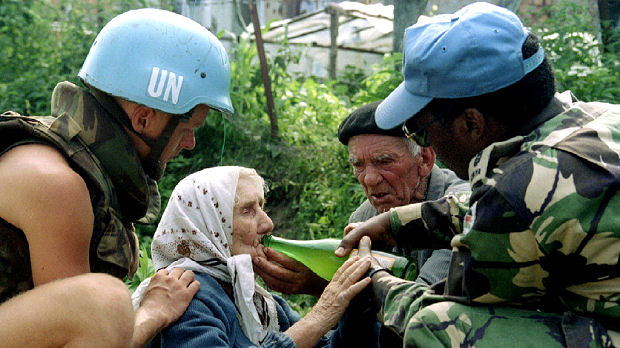Mladic arrest revives UN’s Srebrenica trauma
 Alex Thomson
Chief Correspondent
Alex Thomson
Chief Correspondent
On the day Ratko Mladic is arrested, Alex Thomson writes that the UN experience of setting up and policing the “safe haven” in Srebrenica remains a traumatic event for that organisation.

The UN experience of setting up and supposedly policing the Srebrenica “safe haven” remains a traumatic episode for that organisation.
As it happens, it fell to a Dutch army battalion to make sure that Bosnian Muslims were, in fact, safe in the “haven” of Srebrenica, a small town in the mountains of central Bosnia.
But there’s no point in pointing the finger of blame at the Dutch for what happened. As likely as not, it would have happened to pretty much any nation of soldiers.
<!–
–> <!–
–>
 In pictures: war, genocide and Ratko Mladic. Click here for more.
In pictures: war, genocide and Ratko Mladic. Click here for more.
Because when it did, I for one cannot forget the images of exhausted elderly men along with women and children, coming out from Srebrenica over the wooded hills, utterly terrified and exhausted.
There was the video which emerged of women and children being herded onto buses and separated from their men. Anyone in the Balkans knew what this was a prelude to.
I cannot forget the images of exhausted, elderly men along with women and children, coming out from Srebrenica.
In the years that passed there would be more video. Of General Mladic’s men being blessed by Serb Orthodox priests before going off to deal with the men of Srebrenica. Of those men being duly lined up along mountain roads, hands tied, and shot by Serb forces – many of them teenagers. All civilians and unarmed – had they been soldiers it would not be any less of a war crime.
In the end more than 8,000 people were massacred in and around Srebrenica – the largest single reported massacre in a war of war vile, small-scale liquidation of civilians, village by village, town by town. The wars for which the equally vile phrase “ethnic cleansing” came into our language and stayed.
Has much changed? It would be good to think so. But consider only this fact – unlikely to get much coverage. Yesterday Amnesty International issued a report criticising the UN for failing to prevent the massacre of hundreds of civilians recently in Ivory Coast.
These people were cut down in the recent brutal civil war, even though a UN base to protect them was very close to the location of the massacres. Tell that to the fatherless of Srebrenica.